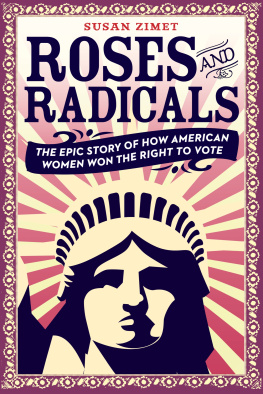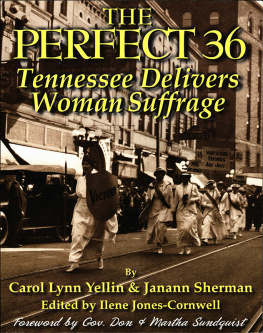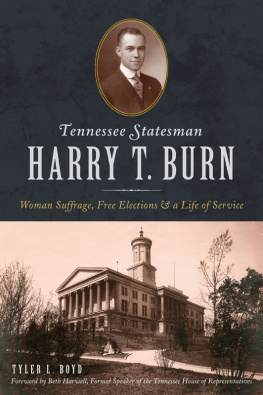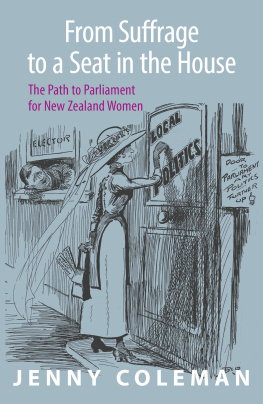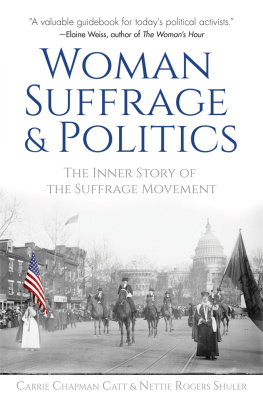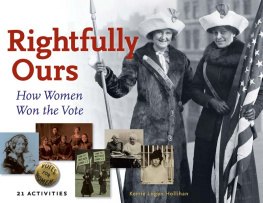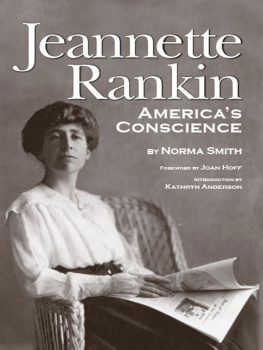ABOUT THE AUTHOR
Mary Barmeyer OBrien was born and raised in Missoula, Montana, and received a B.A. in Sociology from Linfield College in McMinnville, Oregon. She is the author of six other books about womens history and pioneers on the overland trails, including Across Death Valley: The Pioneer Life of Juliet Wells Brier; Outlasting the Trail: The Story of a Womans Journey West; and May: The Hard-Rock Life of Pioneer May Arkwright Hutton. Mary writes from her home in Polson, Montana, and enjoys hiking, camping, and reading. She and her husband, Dan, have three grown children.
ACKNOWLEDGMENTS
Special thanks to Virginia Ronhovde, Jeannette Rankins niece; Don Spritzer, former reference librarian at the Missoula (Montana) Public Library; and Pat Ortmeyer of Missoulas Jeannette Rankin Peace Resource Center who each read my manuscript for precision of detail prior to its publication.
I am also indebted to Marilyn Trosper, library director at North Lake County Public Library in Polson, Montana, and to the late Dave Walter, research historian with the Montana Historical Society, for their assistance with my research, and to Bette Ammon and Don Spritzer, formerly of the Missoula Public Library, for their written support of this project. Id like to express my gratitude to fellow writers Maggie Plummer and Woodeene Koenig-Bricker for their valuable advice, to the schoolchildren who read the manuscript and offered me their fresh perspectives, and especially to my family and friends who were a constant source of encouragement and support.
BIBLIOGRAPHY
Acceptance and Dedication of the Statue of Jeannette Rankin 1880-1973. Washington, D.C.: U.S. Government Printing Office, 1987.
Block, Judy Rachel. First Woman in Congress: Jeannette Rankin. New York: Contemporary Perspectives, Inc., 1978.
Cohen, Stan. Missoula Country Images, Vol. II. Missoula, Montana: Pictorial Histories Publishing Co. Inc., 1993.
Giles, Kevin S. Flight of the Dove: The Story of Jeannette Rankin. Beaverton, Ore.: The Lochsa Experience, Touchstone Press, 1980.
Josephson, Hannah. First Lady in Congress: Jeannette Rankin. Indianapolis and New York: The Bobbs-Merrill Co. Inc., 1974.
Lang, William L., and Rex C. Meyers. Montana, Our Land and People. Boulder, Colo.: Pruett Publishing Co., 1979.
Malone, Michael P., and Richard B. Roeder. Montana: A History of Two Centuries. Seattle and London: University of Washington Press, 1977.
Millis, Walter. Road to War: America 1914-1917. Cambridge, Mass.: Riverside Press, 1953.
White, Florence Meiman. First Woman in Congress: Jeannette Rankin. New York: Julian Messner, 1980.
Unpublished Manuscripts/Speech Texts
Schaffer, Ronald. Jeannette Rankin, Progressive Isolationist. Ann Arbor, Mich.: University Microfilms, 1970.
Wilson, Joan Hoff. The Search for Jeannette Rankins Past. Text of address to the Montana Library Association, Bozeman, Mont. May 4, 1979.
Periodicals
Board, John C. Jeannette Rankin: The Lady from Montana, Montana: The Magazine of Western History 17 (July 1967): 2-17.
Brown, Mackey. Montanas First Woman PoliticianA Recollection of Jeannette Rankin Campaigning, Montana Business Quarterly (Autumn 1971): 23-26.
Kennedy, John F. A Woman of Courage, McCalls (July 1958): 43-44.
McNamee, Wally. The Women March, The Washington Post, January 16, 1968.
Harris, Ted C. Jeannette Rankin in Georgia, The Georgia Historical Quarterly (Spring 1974): 55-78.
Larson, T.A. Montana Women and the Battle for Ballot: Woman Suffrage in the Treasure State, Montana: The Magazine of Western History (Winter 1973): 34.
Rankin, Jeannette. Excerpt from statement to The Missoulian, December 10, 1941.
Rankin, Jeannette (ghostwritten by Katharine Anthony). What We Women Should Do, Ladies Home Journal (August 1917): 17.
Walter, Dave. Rebel with a Cause, Montana Magazine (November/December 1991): 66-72.
Wilson, Joan Hoff. Jeannette Rankin and American Foreign Policy: The Origins of Her Pacifism, Montana: The Magazine of Western History (Winter 1980): 28-41.
Wilson, Joan Hoff. Jeannette Rankin and American Foreign Policy: Her Lifework as a Pacifist, Montana: The Magazine of Western History (Spring 1980): 38-53.
Winestine, Belle Fligelman. Mother Was Shocked, Montana: The Magazine of Western History (Summer 1974): 70-79.
References
Constitution of the United States, Nineteenth Amendment.
Congressional Record, Woman Suffrage Speech of Hon. Jeannette Rankin of Montana in the House of Representatives, January 10, 1918.
Encyclopedia Americana, International Edition. New York: Americana Corporation, 1977.
United States Federal Census for 1900, Missoula County, Hellgate Township, ED 67, Sheet 3, Lines 44ff.
World Book Encyclopedia, vols. 1-18. Chicago: Field Enterprises Inc., 1953.
Video
The Woman Who Voted No, produced by Ronn Bayly, Nancy Landgren, and Susan Regele. UM Materials Services, 29 minutes.
Sound Recordings
Interview with Jeannette Rankin, by John Board, Missoula, Mont. August 29, 1963.
Interview with Winfield Page (regarding Jeannette and Wellington Rankin), by Helen Ward Bonner, July 9, 1980.
Interview with Vivian Halinan (regarding Jeannette Rankin), by Helen Ward Bonner, July 16, 1980.
Interview with Belle Winestine, by Helen Ward Bonner.
Interview with Tom Haines (former assemblyman and acquaintance of Jeannette Rankin), by Helen Ward Bonner, Missoula, Mont. July 8, 1980.
ONE
A Lone Vote
SILENCE FELL OVER THE U.S. CONGRESS. A CROWD OF restless lawmakers and visitors quieted as they waited for Representative Jeannette Rankin to speak. The moment had come for the congresswoman from Montana to cast her vote.
It was December 8, 1941. Up to that day, the United States of America had been able to stay out of the dreadful conflict called World War II. But tragedy had struck a few hours before. Japanese warplanes had bombed Pearl Harbor, the U.S. Navys largest base in the Pacific Ocean. More than 3,500 people had been killed or wounded during the surprise attack. Huge ships had sunk into the once-peaceful Hawaiian harbor. The bombing raid had destroyed U.S. Army and Navy planes by the hundreds.
Shock, anger, and grief rocked the nation.
Almost immediately, President Franklin D. Roosevelt responded to the countrys outrage. He asked Congress to declare war on Japan.
Most people hoped every lawmaker would vote yes so that the Japanese would be sent a forceful, unanimous message. They believed the attack on a U.S. naval base had made the situation clear, and that the time had come for their country to join the side of the Allies in the conflicts then raging around the globe.
But sixty-year-old congresswoman Jeannette Pickering Rankin of Montana believed war was wrong. For the previous twenty years she had worked night and day to bring about world peace. She had voted against war once before in Congress. In everything she did, Jeannette struggled to end war forever.
She also had a promise to keep. When she campaigned for Congress, she had told Montanans that if she was elected she would help keep their sons out of World War II.
She had tried to explain her views. Mr. Speaker! she called out as Congress discussed President Roosevelts request for a declaration against Japan. I would like to be heard! Again and again she tried to speak against the war. Again and again, despite her bold efforts, she was ignored or shouted down by the Speaker of the House and other congressmen. Mr. Speaker! she exclaimed.
But the clerk had begun reading the roll call. As their names were read, the representatives voted aloud. Each one had said yes to declaring war on Japan. Jeannette Rankin was next on the list.


